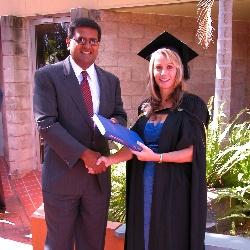Leonie masters mud crabs
Published on 10 June, 2004
Central Queensland University graduate Dr Leonie Andersen was recently presented with a Master of Applied Science degree after four years of research on mud crab shell disease.
An outbreak of rust spot lesions on the shells of the local mud crab population raised the concern of local fisherman and instigated a fisheries funded research investigation into the problem.
 “What was special about this degree was that it was supported by Boyne Smelters Ltd. (BSL) and Southern Pacific Petroleum Development (SPPD) (now Queensland Energy Resources Ltd.). This made it the first local industry supported research higher degree to be completed at the Centre of Environmental Management” said Dr Andersen.
“What was special about this degree was that it was supported by Boyne Smelters Ltd. (BSL) and Southern Pacific Petroleum Development (SPPD) (now Queensland Energy Resources Ltd.). This made it the first local industry supported research higher degree to be completed at the Centre of Environmental Management” said Dr Andersen.
Both BSL and SPPD donated $5000 towards the costs of the research.
Leonie’s research found that the rust spots were linked to an accumulation of heavy metals in stressed crabs. However, most importantly the mud crabs were still safe to eat and marketability was unlikely to be affected.
CQU Gladstone head of campus, Associate Professor Bob Prater said Leonie’s research was significant as it demonstrated the local industries' commitment to collaborative research between the industry and CQU.
“Since Leonie’s research we now have a further six students undertaking industry based projects at the PELM centre, and two of these are in the final stages of their work.
“The support of industry is very important for these students, but of equal significance is that they are researching topics which are relevant to industry.
Dr Andersen is now involved in environmental monitoring and researching the effects of pollution on marine animals in the environment.
She has recently been appointed as Chair of CQU's Animal Ethics Committee.

